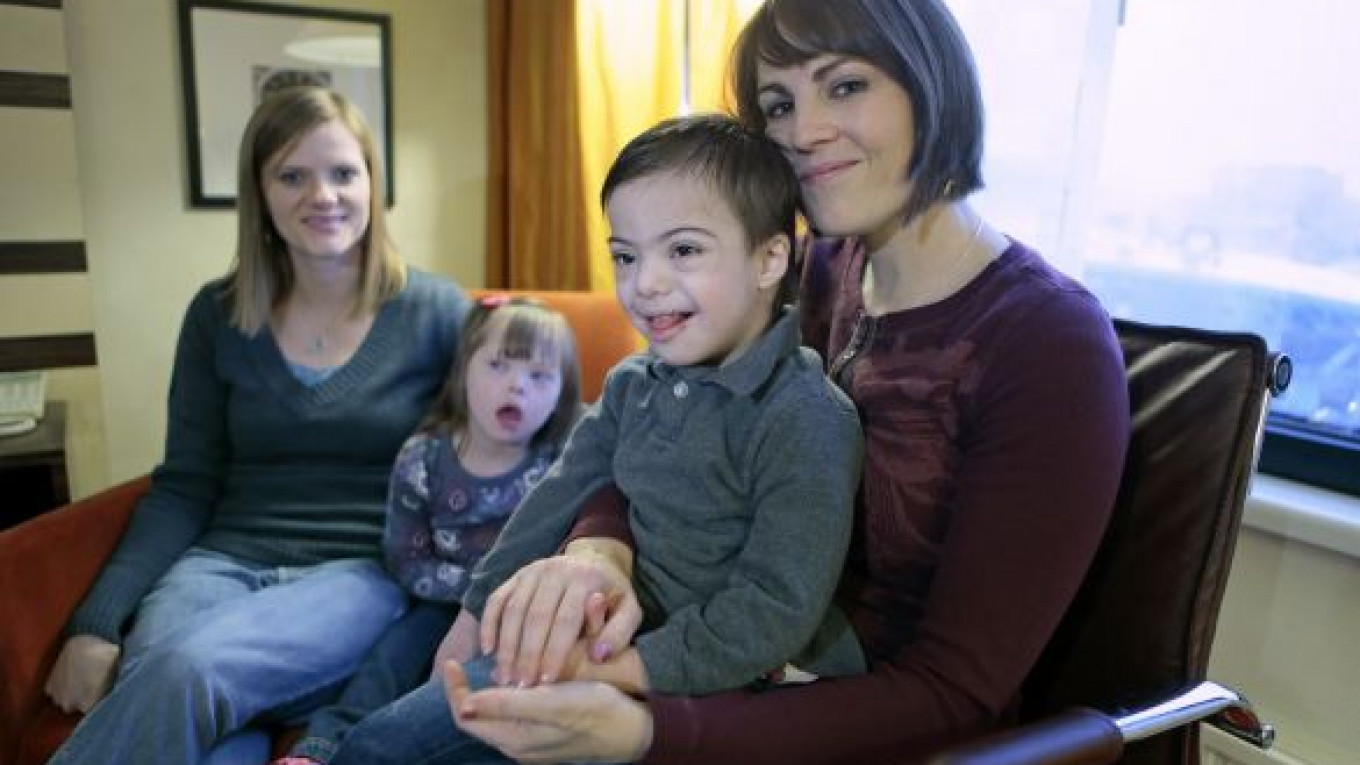After weeks of anxiety plodding through the opaque Russian legal system, two U.S. women have custody of their adopted Russian children and are preparing to take them home to start a new life together.
On Saturday, Jeana Bonner, of South Jordan, Utah, and Rebecca Preece, of Nampa, Idaho, talked about the expenses, confusion and emotional swings they've gone through since arriving in Moscow in mid-January, expecting to quickly leave with their children, both of whom have Down syndrome.
The Bonners and Preeces each have another child with the syndrome.
Bonner and Preece, and their husbands, Wayne and Brian, had spent about a year, including multiple trips to Russia, to arrange for the adoption of the 5-year-old girl and 4 1/2-year-old boy. By late 2012, the adoptions had received court approval, and they thought all they had to do was wait out the 30-day period in which such rulings can be challenged.
But in those 30 days, a ban on Americans adopting Russian children sped through parliament and into law, part of a hastily born package of measures retaliating against a new U.S. law allowing sanctions on Russians identified as human rights violators.
When Jeana Bonner and the Preeces arrived in Moscow, they found themselves caught in a legalistic blind alley. Although officials said adoptions approved before the ban would go through, the judge who was to issue the decree formally granting custody said the ban meant there was now no mechanism for him to do so.
Help came from a surprising quarter: the office of children's rights ombudsman Pavel Astakhov, who has been one of the strongest critics of American adoptions. The office appointed an attorney for the Preeces and Bonners, who obtained a Supreme Court order directing the lower court to immediately issue the decree, Bonner said.
"We were really excited and thought 'Let's go pick up our children,'" Bonner said.
But the lower court waited another 15 days.
"That was really frustrating and disheartening" especially because some other American adoptive parent had received quick action from courts in other parts of Moscow, she said.
The delay forced Brian Preece to go back home to tend to the family's fireplace business. The two women stayed, racking up what Rebecca Preece said was "a couple thousand dollars" in costs for food, accommodation and canceled flights.
When the decree came through on Tuesday, the women rushed to the orphanages.
"It was an amazing day, just so special, what we'd hoped and dreamed it would be," Bonner said.
Both aim to leave Russia on Tuesday.
Meanwhile, they've been doting on the kids, who are keeping their Russian names as middle names and getting new first names: Jaymi Viktoria Bonner and Gabriel Artur Preece.
The children have already brought some cheerful surprises to the toy-laden hotel rooms where they're staying until the flight to the U.S.
"As soon as he saw the bathtub, he wanted a bath," Preece said. "That's been his favorite thing to do, sit in the warm water, sit and splash in the bathtub."
The pleasure of finally having the children has smoothed over much of the last month's distress, and the women expect to leave Russia with favorable memories.
In light of Astakhov's criticism of American adoptions and frequent complaints that adopted Russian children face abuse and even death at the hands of their new parents, "we were very surprised that he had appointed that attorney for us," Preece said.
"It makes us hopeful for the other families that have met their children and really would like to finish their adoptions," she said. "It makes us hopeful that they will do the right thing for these families as well."
At the time the ban went into effect, 46 adoption cases went into legal limbo. U.S. officials have not said how many cases have been resolved.
Related articles:
A Message from The Moscow Times:
Dear readers,
We are facing unprecedented challenges. Russia's Prosecutor General's Office has designated The Moscow Times as an "undesirable" organization, criminalizing our work and putting our staff at risk of prosecution. This follows our earlier unjust labeling as a "foreign agent."
These actions are direct attempts to silence independent journalism in Russia. The authorities claim our work "discredits the decisions of the Russian leadership." We see things differently: we strive to provide accurate, unbiased reporting on Russia.
We, the journalists of The Moscow Times, refuse to be silenced. But to continue our work, we need your help.
Your support, no matter how small, makes a world of difference. If you can, please support us monthly starting from just $2. It's quick to set up, and every contribution makes a significant impact.
By supporting The Moscow Times, you're defending open, independent journalism in the face of repression. Thank you for standing with us.
Remind me later.


